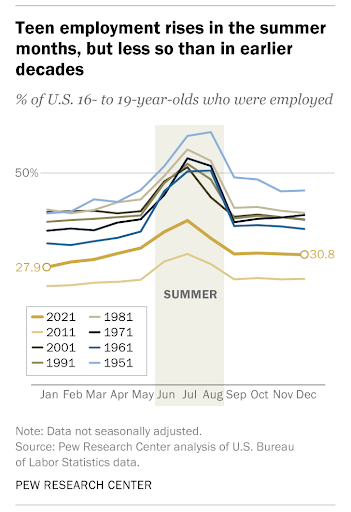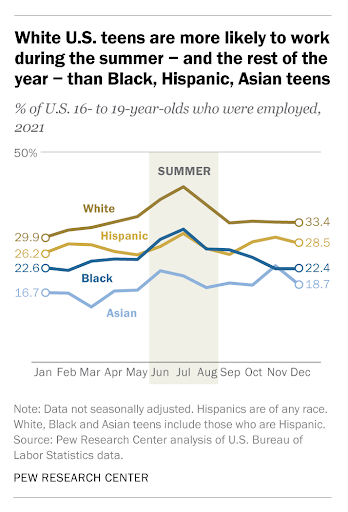
Summer is special for kids. It's different from the school year.
In This Lesson

What is summer learning loss?
How much do students forget over the summer?
Why are summers bad for students?
Why do we have summer vacation?
Where can I find a summer school for my kids?
Where can I find a summer job?
▶ Watch the video summary
★ Discussion Guide
I remember my childhood summers fondly. I spent endless hours at the pool, learning to swim. I devoured books from the library. My parents sometimes enrolled me in summer camps, some of which I liked. I don't remember studying, exactly, but my mother was at home, and she was a sneaky teacher. I suspect I was learning without noticing.
Summer is unequal
For many families, summers can be stressful. During the academic year, school is a safe place for kids to be five days a week. When school is out, families have to figure out where their kids can go, how to get them there, and how to feed them without the help of the school lunch program. Academic advancement isn't necessarily at the top of the list of priorities during the summer.
Summers probably make achievement gaps worse
Learning is a cumulative process, like a rolling, growing snowball. Under the right conditions, what kids already understand serves as a base for what they learn next. Early learning sets the stage for kindergarten. Knowing letters sets the stage for reading words, then books. Learning English in school sets the stage for using it.
Decades ago, education researchers made the case that summers melt the snowball effect of learning. When students stop learning for the summer, they start forgetting. It makes sense that this summer learning loss effect is uneven, of course — some families can afford enriching opportunities for their children in the summer, but others can't. Summers contribute to the achievement gap between students from higher-wealth and lower-wealth families.
The theory of summer learning loss is tidy and logical, but it's important to acknowledge that the research base for it isn't actually all that strong. Some researchers, looking to quantify the amount of learning lost during summer breaks, have questioned the scope of academic harm caused. Maybe the summer is more of a skid than a slide, they suggest.
Regardless, it's useful to think of summers as a time of opportunity, when something different can happen. Academic achievement gaps that are present in early childhood tend to be durable, and summers don't generally seem to make them better. But they could. No rule says that summer has to be a time of drift. Summer can also be a time of reinvention and inquiry.
Why is summer a time for vacation?
Many suppose that the long summer break in the school calendar is somehow connected to America's agricultural past. This is probably a myth.
Many suppose the long summer break is somehow connected to America’s agricultural past. This is probably a myth.
The complicated history of summer vacation probably has more to do with the sweltering discomfort of a stuffy classroom than with the needs of the fields. Before the widespread availability of air conditioning, classrooms were pretty awful in the summer!
Should school calendars be year-round?
From time to time, school districts consider shifting to a year-round schedule in which breaks are shorter and more evenly spaced through the school year. These conversations tend to emerge in overcrowded schools in opposition to raising taxes for a school construction bond. You can squeeze more students into the building if they take turns using it, right? Few districts have gone for it, but some have studied the idea.
Summer school costs money
For families with money, there are many summer programs for children, many of them great, and not all of them academically focused.
Subsidized or free summer programs exist in many areas of California. The most important program, created in 2021, is the Expanded Learning Opportunities Program (ELO-P). In 2024 the state budget included more than $4 billion for it, a serious commitment. The state also funds ASES, an older program.
For many years, the federal budget included grants to support afterschool and summer programs in high-need communities around the country. The program, known as 21st Century Community Learning Centers, was dramatically slashed in the 2025 presidential budget proposal along with other programs for children and families.
School districts have substantial control over how they use their budgets. Could they use funds to run academically-focused summer programs? Absolutely, and some have done so. It's a matter of priorities, and of negotiation with the teachers union.
Public funding for after-school and summer programs is always at risk. Whenever an economic downturn shrinks the economy, tax receipts wither and leaders make hard tradeoffs. For example, in 2008 state many districts cut summer programs in order to sustain core school day services.
The summer job
For some teens, a "summer job" is literally a job, complete with pay. But teen summer jobs have become fairly rare. According to Pew Research Center, "The long-term decline in teens working during the summer is a specific instance of a broader long-term decline in overall youth employment."
All over the world, teen employment has been on a long, steady slide for decades. In America, the Bureau of Labor Statistics reports that teen employment rates have fallen by nearly half in the last 20 years.

Less than a third of teens are employed in the peak month of July. White teens are employed in the summer at dramatically higher rates than nonwhite teens.

Over half of summer jobs for teens are in food service or retail. Getting a job is hard for teens, who must compete with more experienced workers for minimum wage positions.
For most students, working for pay in the summer isn't an option. Most are too young, and the summer "job" for many older students is to look after their younger siblings while their parents are at work. For students living in poverty, summer can make their conditions worse. Their parents may find it harder to care for them while finding ways to earn money and keep food on the table.
While summer plays a unique role in student learning and inequality, it’s not the only out-of-school time that matters. The next lesson explores what we know about how students spend their after-school hours — and why that time matters, too.
This lesson was updated June 2025.
Quiz×
CHAPTER 4:
Spending Time...
-
Spending Time...
Overview of Chapter 4 -
Preschool and Kindergarten
Yes, Early Childhood Education Matters -
Class Size
How Big Should Classes Be? -
School Hours
Is There Enough Time To Learn? -
Time Management in School
Spending Time Well -
Tutoring
When Kids Need More Time and Attention -
Summer School
Time to Learn, or Time to Forget? -
After School Learning
Extending the School Day -
Attendance
Don't Miss School!
Related
- There are no related lessons.
Sharing is caring!
Password Reset
Search all lesson and blog content here.
Login with Email
We will send your Login Link to your email
address. Click on the link and you will be
logged into Ed100. No more passwords to
remember!














Questions & Comments
To comment or reply, please sign in .
Carol Kocivar June 13, 2022 at 8:38 pm
https://www.cde.ca.gov/fg/fo/profile.asp?id=5734&recID=5734
Susannah Baxendale January 17, 2019 at 12:51 pm
Susannah Baxendale January 17, 2019 at 12:49 pm
owenbscott December 3, 2018 at 10:06 pm
Caryn December 4, 2018 at 8:50 am
Susannah Baxendale January 17, 2019 at 12:55 pm
Lisette October 3, 2017 at 4:27 pm
Jeff Camp February 18, 2017 at 12:08 pm
Carol Kocivar July 12, 2016 at 2:22 pm
Check out our Ed100 blog...
/summer-reading/
Carol Kocivar February 3, 2016 at 11:00 am
This Policy Snapshot highlights three areas of legislation:
* Literacy
* STEM (science, technology, engineering, and mathematics)
* Libraries.
http://c.ymcdn.com/sites/www.summerlearning.org/resource/resmgr/Policy/NSLA_2015_State_Policy_Snaps.pdf
Carol Kocivar December 5, 2015 at 11:42 am
The Partnership for Children and Youth has released a sample LCAP to illustrate ways for districts to fund quality summer learning programs.
http://partnerforchildren.org/wp-content/uploads/2014/04/LCAP-template-summer-learning-final.pdf
Tay Fe April 23, 2015 at 2:53 pm
Annie O April 22, 2015 at 6:35 pm
Stacey W April 6, 2015 at 8:36 pm
Veli Waller April 5, 2015 at 8:04 pm
cnuptac March 22, 2015 at 6:38 pm
Rob M April 10, 2011 at 7:58 pm